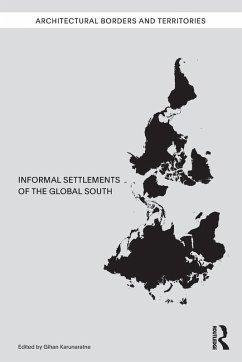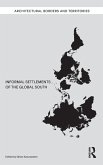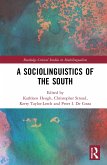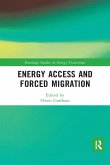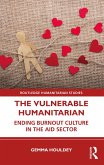Informal Settlements of the Global South
Herausgeber: Karunaratne, Gihan
Informal Settlements of the Global South
Herausgeber: Karunaratne, Gihan
- Broschiertes Buch
- Merkliste
- Auf die Merkliste
- Bewerten Bewerten
- Teilen
- Produkt teilen
- Produkterinnerung
- Produkterinnerung
Bringing together case studies, including the US-Mexico borderlands, the Calais encampment in France, refugee camps in Kenya, Uganda and Bangladesh and â informalâ enclaves in India, China, Brazil, Nigeria and South Africa, this book challenges the thinking about the governance of human settling, mobility, and placemaking.
Andere Kunden interessierten sich auch für
![Informal Settlements of the Global South Informal Settlements of the Global South]() Informal Settlements of the Global South154,99 €
Informal Settlements of the Global South154,99 €![A Sociolinguistics of the South A Sociolinguistics of the South]() A Sociolinguistics of the South43,99 €
A Sociolinguistics of the South43,99 €![Energy Access and Forced Migration Energy Access and Forced Migration]() Energy Access and Forced Migration45,99 €
Energy Access and Forced Migration45,99 €![The Vulnerable Humanitarian The Vulnerable Humanitarian]() Gemma HouldeyThe Vulnerable Humanitarian46,99 €
Gemma HouldeyThe Vulnerable Humanitarian46,99 €![Architectural Technicities Architectural Technicities]() Stavros KousoulasArchitectural Technicities174,99 €
Stavros KousoulasArchitectural Technicities174,99 €![Architectural Technicities Architectural Technicities]() Stavros KousoulasArchitectural Technicities56,99 €
Stavros KousoulasArchitectural Technicities56,99 €![The Child Soldiers of Africa's Red Army The Child Soldiers of Africa's Red Army]() Carol BergerThe Child Soldiers of Africa's Red Army45,99 €
Carol BergerThe Child Soldiers of Africa's Red Army45,99 €-
-
-
Bringing together case studies, including the US-Mexico borderlands, the Calais encampment in France, refugee camps in Kenya, Uganda and Bangladesh and â informalâ enclaves in India, China, Brazil, Nigeria and South Africa, this book challenges the thinking about the governance of human settling, mobility, and placemaking.
Produktdetails
- Produktdetails
- Architectural Borders and Territories
- Verlag: Taylor & Francis Ltd
- Seitenzahl: 330
- Erscheinungstermin: 28. November 2024
- Englisch
- Abmessung: 234mm x 156mm x 18mm
- Gewicht: 508g
- ISBN-13: 9781032043111
- ISBN-10: 1032043113
- Artikelnr.: 71911044
- Herstellerkennzeichnung
- Libri GmbH
- Europaallee 1
- 36244 Bad Hersfeld
- gpsr@libri.de
- Architectural Borders and Territories
- Verlag: Taylor & Francis Ltd
- Seitenzahl: 330
- Erscheinungstermin: 28. November 2024
- Englisch
- Abmessung: 234mm x 156mm x 18mm
- Gewicht: 508g
- ISBN-13: 9781032043111
- ISBN-10: 1032043113
- Artikelnr.: 71911044
- Herstellerkennzeichnung
- Libri GmbH
- Europaallee 1
- 36244 Bad Hersfeld
- gpsr@libri.de
Gihan Karunaratne is a Sri Lankan-born British architect and studied at Royal College of Arts and Bartlett School of Architecture. He has taught and lectured in Architecture, Urban Design and Interior Design in the UK, Sri Lanka and China. He writes and researches extensively on art, architecture and urban design. Gihan's current research interests are in architecture and urban conditions within cities which are undergoing constant physical, economic or social changes in patterns of urban living. In many of his projects he has researched and explored the underbelly of the city in detail, specifically focussing on non-conformist marginalized communities. From urban transition courses and temporality in the Global South, he remains actively engaged in urban research with focus on informal settlements and communities.
Introduction. Section 1: The emergence of 'global south spaces' in the
north. 1.Diasporic Urbanism. 2.Temporary Sheltering, Empowering Design, and
The Jungle: A Case for Architects. 3.Wireless borders: illegal bodies and
connected futures. 4.Connecting the Camps: Spatialising the ECHO Mobile
Library in Greece. 5.Digital and physical spaces in informal settlements:
Migrants, Refugee Camps, and Mapping. Section 2: Seeking Refuge in Global
South Camps. 6.Accommodating Informality in the Spatial Planning of the
Kalobeyei Refugee Settlement, Kenya. 7.Understanding the Everyday Movements
of South Sudanese Refugees in Uganda. 8.The Ephemeral as an instrument of
Urban Design and Planning. Section 3: Informal responses of the Informal
Settlements in the Global South. 9.The Invisible beyond Visible: The Perils
of Urban Regeneration in Colombo's Slave Island. 10.A Note on the Door:
Symbolic Erasure and Representational Resistance in Rio de Janeiro.
11.Organic Urban Regeneration: An Inclusive Urban Design for Rural-to-Urban
Migrants in Residential Neighborhoods of Ningbo, China. 12.Towards a
'hybrid' governance approach: The way out of the urban development crisis
in Lagos, Nigeria? A critical assessment with Makoko as a case study.
13.Embracing in[formal]ity: An exploration of grounded architectural
practice in Cape Town. 14.The Why? How? What? and What-ifs of mass slum
rehabilitation housing in India. CODA 15.The Pandemic and Informal
settlements. Index.
north. 1.Diasporic Urbanism. 2.Temporary Sheltering, Empowering Design, and
The Jungle: A Case for Architects. 3.Wireless borders: illegal bodies and
connected futures. 4.Connecting the Camps: Spatialising the ECHO Mobile
Library in Greece. 5.Digital and physical spaces in informal settlements:
Migrants, Refugee Camps, and Mapping. Section 2: Seeking Refuge in Global
South Camps. 6.Accommodating Informality in the Spatial Planning of the
Kalobeyei Refugee Settlement, Kenya. 7.Understanding the Everyday Movements
of South Sudanese Refugees in Uganda. 8.The Ephemeral as an instrument of
Urban Design and Planning. Section 3: Informal responses of the Informal
Settlements in the Global South. 9.The Invisible beyond Visible: The Perils
of Urban Regeneration in Colombo's Slave Island. 10.A Note on the Door:
Symbolic Erasure and Representational Resistance in Rio de Janeiro.
11.Organic Urban Regeneration: An Inclusive Urban Design for Rural-to-Urban
Migrants in Residential Neighborhoods of Ningbo, China. 12.Towards a
'hybrid' governance approach: The way out of the urban development crisis
in Lagos, Nigeria? A critical assessment with Makoko as a case study.
13.Embracing in[formal]ity: An exploration of grounded architectural
practice in Cape Town. 14.The Why? How? What? and What-ifs of mass slum
rehabilitation housing in India. CODA 15.The Pandemic and Informal
settlements. Index.
Introduction. Section 1: The emergence of 'global south spaces' in the
north. 1.Diasporic Urbanism. 2.Temporary Sheltering, Empowering Design, and
The Jungle: A Case for Architects. 3.Wireless borders: illegal bodies and
connected futures. 4.Connecting the Camps: Spatialising the ECHO Mobile
Library in Greece. 5.Digital and physical spaces in informal settlements:
Migrants, Refugee Camps, and Mapping. Section 2: Seeking Refuge in Global
South Camps. 6.Accommodating Informality in the Spatial Planning of the
Kalobeyei Refugee Settlement, Kenya. 7.Understanding the Everyday Movements
of South Sudanese Refugees in Uganda. 8.The Ephemeral as an instrument of
Urban Design and Planning. Section 3: Informal responses of the Informal
Settlements in the Global South. 9.The Invisible beyond Visible: The Perils
of Urban Regeneration in Colombo's Slave Island. 10.A Note on the Door:
Symbolic Erasure and Representational Resistance in Rio de Janeiro.
11.Organic Urban Regeneration: An Inclusive Urban Design for Rural-to-Urban
Migrants in Residential Neighborhoods of Ningbo, China. 12.Towards a
'hybrid' governance approach: The way out of the urban development crisis
in Lagos, Nigeria? A critical assessment with Makoko as a case study.
13.Embracing in[formal]ity: An exploration of grounded architectural
practice in Cape Town. 14.The Why? How? What? and What-ifs of mass slum
rehabilitation housing in India. CODA 15.The Pandemic and Informal
settlements. Index.
north. 1.Diasporic Urbanism. 2.Temporary Sheltering, Empowering Design, and
The Jungle: A Case for Architects. 3.Wireless borders: illegal bodies and
connected futures. 4.Connecting the Camps: Spatialising the ECHO Mobile
Library in Greece. 5.Digital and physical spaces in informal settlements:
Migrants, Refugee Camps, and Mapping. Section 2: Seeking Refuge in Global
South Camps. 6.Accommodating Informality in the Spatial Planning of the
Kalobeyei Refugee Settlement, Kenya. 7.Understanding the Everyday Movements
of South Sudanese Refugees in Uganda. 8.The Ephemeral as an instrument of
Urban Design and Planning. Section 3: Informal responses of the Informal
Settlements in the Global South. 9.The Invisible beyond Visible: The Perils
of Urban Regeneration in Colombo's Slave Island. 10.A Note on the Door:
Symbolic Erasure and Representational Resistance in Rio de Janeiro.
11.Organic Urban Regeneration: An Inclusive Urban Design for Rural-to-Urban
Migrants in Residential Neighborhoods of Ningbo, China. 12.Towards a
'hybrid' governance approach: The way out of the urban development crisis
in Lagos, Nigeria? A critical assessment with Makoko as a case study.
13.Embracing in[formal]ity: An exploration of grounded architectural
practice in Cape Town. 14.The Why? How? What? and What-ifs of mass slum
rehabilitation housing in India. CODA 15.The Pandemic and Informal
settlements. Index.

